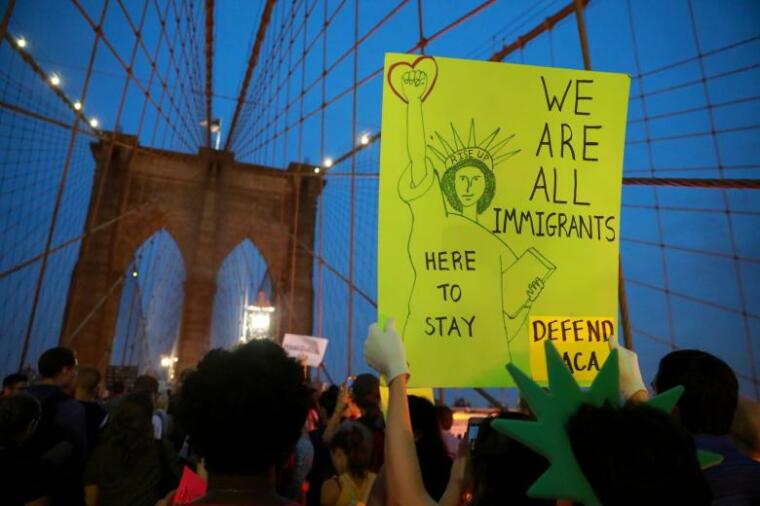Prominent evangelical leaders sign letter calling for immigration reform

Prominent evangelical leaders have joined up with senators to call on Congress and President Donald Trump to pass a new measure that would protect children of undocumented immigrants.
In an open letter published in a full-page advertisement in The Washington Post on Wednesday, the evangelical leaders and lawmakers spoke about the need to help persecuted Christians, refugees from different religious backgrounds, immigrant families awaiting reunification and dreamers.
Among those who signed the letter were devotional author Max Lucado, Bible teacher Beth Moore, and Village Church pastor Matt Chandler. The letter was also signed by Ann Voskamp, who had previously spoken out on immigration issues, and Samuel Rodriguez, the president of the National Hispanic Christian Leadership Conference.
The letter was spearheaded by World Relief, a ministry that partners with churches to serve vulnerable people across the globe.
"As Christian leaders, we have a commitment to caring for the vulnerable in our churches while also supporting just, compassionate and welcoming policies toward refugees and other immigrants," the letter read, as reported by CBN News.
"The Bible speaks clearly and repeatedly to God's love and concern for the vulnerable and also challenges us to think beyond our nationality, ethnicity or religion when loving our neighbor," it continued.
The evangelical leaders also expressed concern about the sharp decline of refugees that were allowed to enter the U.S. under the Trump administration.
"God ordained the family as the cornerstone of society, and we believe that our country is stronger when our citizens can be quickly reunited with their close family members. We pray you will respect the unity of the family," the evangelical leaders wrote.
In September, the Trump administration announced that it was rescinding the DACA program, which temporarily allowed immigrants who were brought to the U.S. illegally to stay in the country if they met certain requirements and applied for the program.
U.S. Attorney General Jeff Sessions said at the time that the program has been viewed as an unlawful unilateral action on the part of the previous administration.
Last month, federal judge William Alsup of San Francisco had temporarily blocked the administration's efforts to end DACA, saying the Department of Homeland Security's decision to rescind the program was based on a "flawed legal premise."
The decision allowed DACA recipients who failed to renew their status by last year's deadline to renew their applications, but it did not allow new applications to be submitted.
During his State of the Union address on Jan. 30, Trump had offered DACA legislation that would include a path to citizenship as part of a broader agreement including a border wall and other immigration reforms.
The U.S. government recently came to a shutdown after Democrats, and Republicans failed to reach a compromise on several issues including the protection of DACA recipients. On Tuesday, Chief of Staff John Kelly said that it is unlikely that the president will extend the March 5 DACA deadline if Congress does not reach an agreement by that time.
 Christians don't have to affirm transgenderism, but they can’t express that view at work: tribunal
Christians don't have to affirm transgenderism, but they can’t express that view at work: tribunal Archaeology discovery: Medieval Christian prayer beads found on Holy Island
Archaeology discovery: Medieval Christian prayer beads found on Holy Island Presbyterian Church in America votes to leave National Association of Evangelicals
Presbyterian Church in America votes to leave National Association of Evangelicals Over 50 killed in 'vile and satanic' attack at Nigerian church on Pentecost Sunday
Over 50 killed in 'vile and satanic' attack at Nigerian church on Pentecost Sunday Ukrainian Orthodox Church severs ties with Moscow over Patriarch Kirill's support for Putin's war
Ukrainian Orthodox Church severs ties with Moscow over Patriarch Kirill's support for Putin's war Islamic State kills 20 Nigerian Christians as revenge for US airstrike
Islamic State kills 20 Nigerian Christians as revenge for US airstrike Man who served 33 years in prison for murder leads inmates to Christ
Man who served 33 years in prison for murder leads inmates to Christ


 Nigerian student beaten to death, body burned over ‘blasphemous’ WhatsApp message
Nigerian student beaten to death, body burned over ‘blasphemous’ WhatsApp message 'A new low': World reacts after Hong Kong arrests 90-year-old Cardinal Joseph Zen
'A new low': World reacts after Hong Kong arrests 90-year-old Cardinal Joseph Zen Iran sentences Christian man to 10 years in prison for hosting house church worship gathering
Iran sentences Christian man to 10 years in prison for hosting house church worship gathering French Guyana: Pastor shot dead, church set on fire after meeting delegation of Evangelicals
French Guyana: Pastor shot dead, church set on fire after meeting delegation of Evangelicals ‘Talking Jesus’ report finds only 6% of UK adults identify as practicing Christians
‘Talking Jesus’ report finds only 6% of UK adults identify as practicing Christians Mission Eurasia ministry center blown up in Ukraine, hundreds of Bibles destroyed: 'God will provide'
Mission Eurasia ministry center blown up in Ukraine, hundreds of Bibles destroyed: 'God will provide' Church holds service for first time after ISIS desecrated it 8 years ago
Church holds service for first time after ISIS desecrated it 8 years ago Burger King apologizes for 'offensive campaign' using Jesus' words at the Last Supper
Burger King apologizes for 'offensive campaign' using Jesus' words at the Last Supper Uganda: Muslims abduct teacher, burn him inside mosque for praying in Christ’s name
Uganda: Muslims abduct teacher, burn him inside mosque for praying in Christ’s name